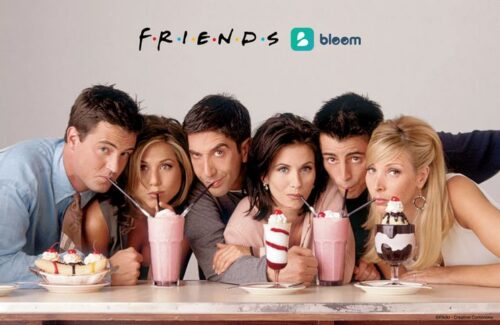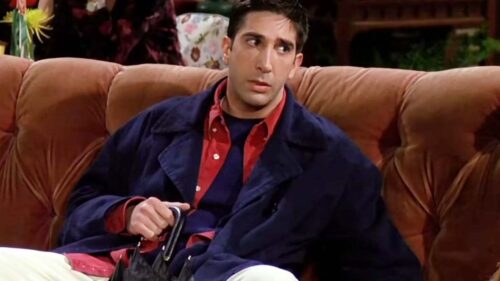 Thanks to this month’s crowd-pleasing reunion special on SKY and NOW TV – FRIENDS fans know the show’s iconic characters better than ever! But there’s always more to learn.
Thanks to this month’s crowd-pleasing reunion special on SKY and NOW TV – FRIENDS fans know the show’s iconic characters better than ever! But there’s always more to learn.
If Rachel, Phoebe, Monica, Ross, Joey and Chandler DID ever choose to have therapy – here’s what might suit them…
The six main characters in the classic sitcom FRIENDS have each received their own “therapy analysis and treatment plan”, designed by Bloom, the leading video self-therapy app. The new personalized therapy plans devised for respectively Monica, Rachel, Phoebe, Ross, Joey and Chandler come in time for the hugely anticipated FRIENDS reunion on SKY and NOW TV this week.
Bloom has also created a light-hearted, interactive quiz, titled: “Which Friends character are you? And which could use the same therapy as you?”
The individual plans for each character draw on the artificial intelligence (AI) technology that Bloom uses to recommend the most suitable interactive video therapy classes and personalized mental health coaching sessions for each of its users.
“Of course, we’re not trying to impose therapy on the characters in Friends”, stresses Leon Mueller, Bloom’s CEO, and long-time Friends fan. “Nor are we saying that they need therapy.”
“But we do believe we can all make use of therapy, as a way of caring for and training our mind, like we do our body. We can all gain from better understanding our thoughts and emotions – and from learning new ways to handle our stresses and worries.” Friends, of course, portrays the lives of six twenty-something friends juggling everyday life, work and relationships in New York. Each of the six has their own quirks and baggage, worries and occasional crises.
The laughs in Friends come most of all from the characters’ foibles: Monica (the uptight one), Chandler (the insecure one), Ross (the nerdy one), Rachel (the spoiled one), Joey (the simple one) and Phoebe (the eccentric one). That is among the reasons that 27 years after it launched in 1994 and 17 after its final episode in 2004, it remains wildly popular, including among those not even born when it ended.
Bloom devised the personalized treatment plans for each of the Friends characters by answering the questions in the way that each character would – if they could – answer themselves.
Monica Geller (The Uptight One)
 Monica strikes many as the most uptight and perhaps neurotic of the main characters – known for being ultra-competitive, a perfectionist and someone who hates losing. Her “Issues and challenges”, says Bloom, include Her ultra-competitiveness and fear of losing – a form of perfectionism and need for control. And her passion – bordering on obsession? – for cleanliness and organization.
Monica strikes many as the most uptight and perhaps neurotic of the main characters – known for being ultra-competitive, a perfectionist and someone who hates losing. Her “Issues and challenges”, says Bloom, include Her ultra-competitiveness and fear of losing – a form of perfectionism and need for control. And her passion – bordering on obsession? – for cleanliness and organization.
The video therapy classes that Bloom’s AI recommends for her include:
- Working Through Worry: Break the habit of worry by accepting imperfections
- [Excerpt] “We’re human, and that means we’re less than perfect, and thinking that worrying helps us to do well is an illusion.”
- Gain Self-Awareness: Understand yourself and how you are perceived
- Reduce stress: Reclaim calm when life gets demanding
- Stop Being Ruled by Fears: Don’t let fear stop you from living your best life
- Relief from Anger: React better to upsetting situations
Chandler Bing (The Insecure One)
 Chandler is the most insecure of the six characters. He still carries the trauma of his parents’ divorce when he was just young. He lacks confidence and feels anxious and awkward with others, especially women. He uses humor and defensiveness to deflect his anxiety. He fears both loneliness and commitment. He struggles to make career decisions.
Chandler is the most insecure of the six characters. He still carries the trauma of his parents’ divorce when he was just young. He lacks confidence and feels anxious and awkward with others, especially women. He uses humor and defensiveness to deflect his anxiety. He fears both loneliness and commitment. He struggles to make career decisions.
The video therapy classes that Bloom recommends for him include:
- Calm Anxiety: Find calm and relief whenever you need it
- Reduce Stress: Reclaim calm when life gets demanding
- Emotional Awareness: Gain more clarity about your feelings
- Meeting Relationship Needs: Practice honesty and feel closer to your partner
- Reframe Loneliness: Stop critical thoughts and grow love from within
Ross Geller (The Nerdy One)
 Ross has a talent for screwing up his relationships, leading to three divorces, which in turn still cause him pain, low moods and depression. He can seem variously whiny, arrogant and defensive. He also has anger management issues.
Ross has a talent for screwing up his relationships, leading to three divorces, which in turn still cause him pain, low moods and depression. He can seem variously whiny, arrogant and defensive. He also has anger management issues.
The video therapy classes that Bloom recommends for him include:
- Meeting Relationship Needs: Practice honesty and feel closer to your partner
- Mindful Communication: Resolve conflicts and build relationships
- Self-Acceptance: Overcome self-criticism and love who you are
- Lift Your Mood with Gratitude: Boost your mood by practicing gratitude
- Relief from Anger: React better to upsetting situations
Rachel Green (The Spoiled One)
 Rachel also has trouble handling personal relationships. She can be spoilt and self-involved. She is indecisive and lacks assertiveness.
Rachel also has trouble handling personal relationships. She can be spoilt and self-involved. She is indecisive and lacks assertiveness.
- Meeting Relationship Needs: Practice honesty and feel closer to your partner
- Understanding your Partner: Feel more open to hear your partner’s experiences.
- Stop Being Ruled by Fears: Don’t let fear stop you from living your best life
Joey Tribbiani (The Simple One)
 Joey worries about money and criticism and his less than brilliant career as an actor. He can also struggle with relationships and gets depressed after Rachel rejects him.
Joey worries about money and criticism and his less than brilliant career as an actor. He can also struggle with relationships and gets depressed after Rachel rejects him.
The video therapy classes that Bloom recommends for him include:
- Relief of Worry: Create a system to worry less and be more at ease
- Understand Depression: Understand depression and re-design your thinking
Phoebe Buffay (The Eccentric One)
 Phoebe is the weird and wacky one – at least on the surface, since she’s also the with one the darkest past and worst childhood, after her mother first abandoned her and her twin sister Ursula and later committed suicide. Ursula hates her. She seems to avoid expressing how she feels about her difficulties, challenges and childhood trauma.
Phoebe is the weird and wacky one – at least on the surface, since she’s also the with one the darkest past and worst childhood, after her mother first abandoned her and her twin sister Ursula and later committed suicide. Ursula hates her. She seems to avoid expressing how she feels about her difficulties, challenges and childhood trauma.
The video therapy classes that Bloom recommends for him include:
- Emotional Awareness: Gain more clarity about your feelings
- Mindful Communication: Resolve conflicts and build relationships
- Understand Depression: Understand depression and re-design your thinking








